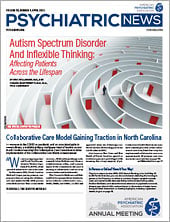APA’s Government, Policy, and Advocacy Update (April 2023)
APA Expresses Support for SAMHSA Expanding Access To Outpatient Treatment Programs
APA, AMA Urge CMS to Finalize Prior Authorization Reforms
APA Responds to CMS’s Request for Information on Essential Health Benefits
Information & Authors
Information
Published In
History
Keywords
- SAMHSA
- Opioid Use Disorder
- Substance Abuse and Mental Health Services Administration
- Outpatient treatment
- OUD Outpatient treatment
- Medications for opioid use disorder
- MOUD
- COVID-19
- Public health emergency
- Drug Enforcement Agency
- Methadone
- Prior authorization
- Chiquita Brooks-LaSure
- Centers for Medicare and Medicaid Services
- American Medical Association
- Office of Inspector General
- Affordable Care Act
- Collaborative Care Model
- children’s mental health emergency
- Essential Health benefits
- Substance use disorders
- Mental health EHBs
- Substance use disorder EHBs
Authors
Metrics & Citations
Metrics
Citations
Export Citations
If you have the appropriate software installed, you can download article citation data to the citation manager of your choice. Simply select your manager software from the list below and click Download.
For more information or tips please see 'Downloading to a citation manager' in the Help menu.
View Options
View options
Login options
Already a subscriber? Access your subscription through your login credentials or your institution for full access to this article.
Personal login Institutional Login Open Athens loginNot a subscriber?
PsychiatryOnline subscription options offer access to the DSM-5-TR® library, books, journals, CME, and patient resources. This all-in-one virtual library provides psychiatrists and mental health professionals with key resources for diagnosis, treatment, research, and professional development.
Need more help? PsychiatryOnline Customer Service may be reached by emailing [email protected] or by calling 800-368-5777 (in the U.S.) or 703-907-7322 (outside the U.S.).
